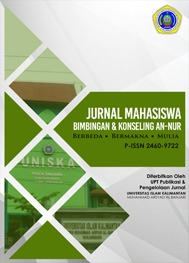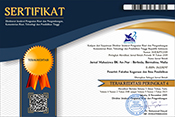KOHESI SOSIAL MENUJU KELUARGA SAKINAH: STUDI SOSIOLOGIS PADA MASYARAKAT NEGERI HUKURILA, KOTA AMBON
(1) Universitas Pattimura
(2) Universitas Pattimura
(3) Univeristas Pattimura
(*) Corresponding Author
Sari
Kata Kunci
Teks Lengkap:
PDFReferensi
Amaliah, R., & Mustafa, A. D. (2021). Mubadalah Sebagai Strategi Preventif Disharmonisasi Keluarga di Masa Pandemi. Prosiding Seminar Nasional Pusat Gender Dan Kesehatan, 13.
Basir, S. (2019). Membangun Keluarga Sakinah. Al-Irsyad Al-Nafs: Jurnal Bimbingan Dan Penyuluhan Islam, 6(2), 99–108.
Bhakti, P. A. K., Taqiyuddin, M., & Saputra, H. (2020). Keluarga Sakinah Menurut Perspektif Al-Qur’an. Al-Tadabbur: Jurnal Ilmu Al-Qur’an Dan Tafsir, 5(02), 229–250.
BPS. (2023). Nikah dan Cerai Menurut Provinsi, 2022. In BPS. https://www.bps.go.id/indikator/indikator/view_data_pub/0000/api_pub/VHpUK3MrOVd6dTJjcHdoQ1Z6TGlmUT09/da_04/1
Chadijah, S. (2018). Karakteristik Keluarga Sakinah dalam Islam. Rausyan Fikr: Jurnal Pemikiran Dan Pencerahan, 14(1).
Creswell, J. W., & Poth, C. N. (2016). Qualitative inquiry and research design: Choosing among five approaches. Sage publications.
Devi, A. K. (2023). Tradisi Pamugih dalam Pernikahan dan Implikasinya terhadap Pembentukan Keluarga Sakinah (Studi Kasus Di Desa Ampelan Kecamatan Wringin Kabupaten Bondowoso). Universitas Islam Negeri Kiai Haji Ahmad Siddiq Jember.
Hennink, M., Hutter, I., & Bailey, A. (2020). Qualitative research methods. Sage.
Hidayat, S. (2014). Konsep Keluarga Sakinah Dalam Tradisi Begalan. Al-Ahwal: Jurnal Hukum Keluarga Islam, 7(1), 85–96.
Hopipah, E. N., & Rosadi, A. (2023). Kawin Cerai di Era Post Modernisme; Studi Kasus Klien Ambu Consulting and Healing Center. Al-’Adalah: Jurnal Syariah Dan Hukum Islam, 8(1), 1–18.
Ibrahim, I. (2020). Tradisi Adu Tumper dalam membangun keluarga sakinah: Studi kasus di Desa Kemiren, Kabupaten Banyuwangi. Universitas Islam Negeri Maulana Malik Ibrahim.
Manna, N. S., Doriza, S., & Oktaviani, M. (2021). Cerai gugat: Telaah penyebab perceraian pada keluarga di Indonesia. Jurnal Al-Azhar Indonesia Seri Humaniora, 6(1), 11–21.
Manuputty, F., Litaay, S. C. H., Murwani, P., & Ramdhan, R. M. (2022). Relationship Changes between Parents and Children of Modern Family during Covid-19 Pandemic in Hukurila, South Leitimur District, Ambon City. International Journal of Social Service and Research (IJSSR), 2(10), 855–862.
Manuputty, F., Murwani, P., Litaay, S. C. H., & Ramdhan, R. M. (2022). Family Response to Changes in Family Key Functions Due to Covid–19 in Hukurila, Ambon City. Budapest International Research and Critics Institute-Journal (BIRCI-Journal), 5(3).
Mu’in, A., & Hefni, M. (2016). Tradisi Ngabulâ di Madura (Sebuah upaya membentuk keluarga sakinah bagi pasangan muda). KARSA: Journal of Social and Islamic Culture, 24(1), 109–125.
Sholeh, M. (2021). Peningkatan Angka Perceraian Di Indonesia: Faktor Penyebab Khulu’dan Akibatnya. Qonuni: Jurnal Hukum Dan Pengkajian Islam, 1(01), 29–40.
Simanjuntak, F. (2018). Problematika Disorganisasi Dan Disharmonisasi Keluarga. Keluarga Yang Misioner, 8.
Tristanto, A. (2020). Perceraian di masa pandemi Covid-19 dalam perspektif ilmu sosial. Sosio Informa: Kajian Permasalahan Sosial Dan Usaha Kesejahteraan Sosial, 6(3), 292–304.
Ufie, A. (2017). Mengonstruksi nilai-nilai kearifan lokal (local wisdom) dalam pembelajaran muatan lokal sebagai upaya memperkokoh kohesi sosial (studi deskriptif budaya Niolilieta masyarakat adat Pulau Wetang Kabupaten Maluku Barat Daya, Propinsi Maluku). Jurnal Pendidikan Dan Pembelajaran (JPP), 23(2), 79–89.
Umam, M. K. (2020). Konsep keluarga sakinah perspektif Mutawalli Al-Sya’rawi. Universitas Islam Negeri Maulana Malik Ibrahim Malang.
Wardah, E. Z. (2010). Tradisi Perkawinan Adu Tumper di Kalangan Masyarakat Using. Jurisdictie: Jurnal Hukum Dan Syariah.
DOI: http://dx.doi.org/10.31602/jmbkan.v9i3.12345
Refbacks
- Saat ini tidak ada refbacks.
Akun Akademik Anda Terhubung dengan :
Didedikasikan Untuk:
Jurnal Mahasiswa BK An-Nur : Berbeda, Bermakna, Mulia disseminated below Lisensi Creative Commons Atribusi 4.0 Internasional.
















